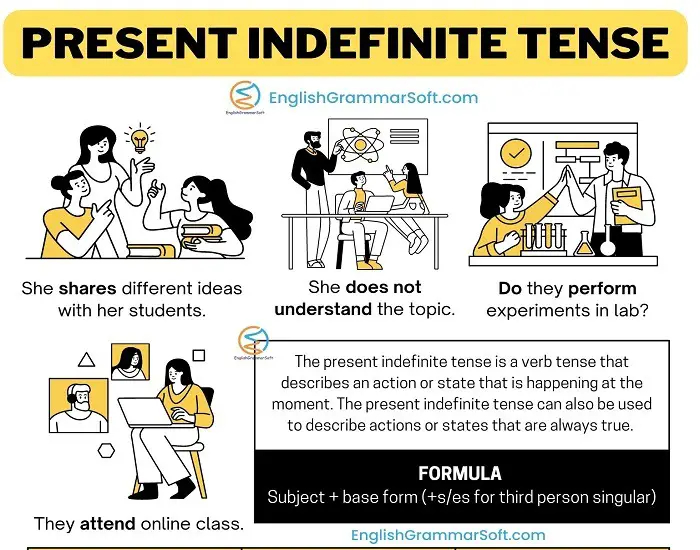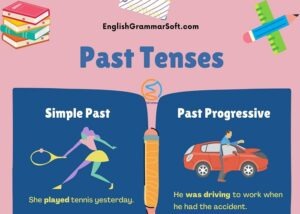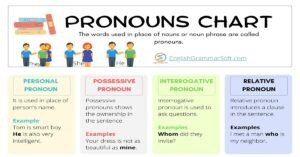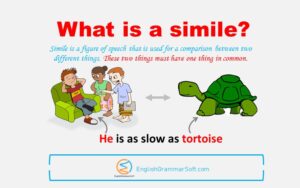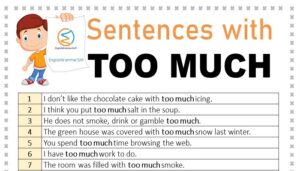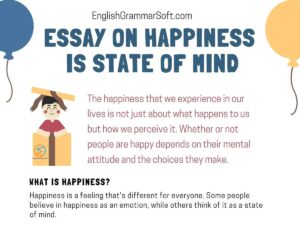Present Indefinite Tense in English (Rules, Formula, 100 Examples & Exercise)
Present indefinite tense is a verb tense. It is used for actions that occur habitually or repeatedly at an unspecified moment that happens in the present. This tense can be used to talk about recurring actions.
The present indefinite tense is used to express actions or states that are always true. It is also used for general truths and for repeated actions. The present indefinite tense is also called the present simple, the present tense, and the non-past. In this post, we’ll look at the formula, rules and several examples.
What is present indefinite tense?
The present indefinite tense is a verb tense that describes an action or state that is happening at the moment. The present indefinite tense can also be used to describe actions or states that are always true. For example, when someone says “I am hungry,” they are describing their current feelings. When someone says “It’s raining outside,” they are describing a current event.
The simple present tense is one of the four present tenses. The other three tenses (present continuous, present perfect and present perfect continuous tense) are formed with the help of auxiliary verbs such as “is/am/are”, “has/have” or “has/have been”.
Signal Words
These signal words can tell you that present indefinite tense is used in a sentence.
- always
- never
- usually
- every day
- every Tuesday
- on Sundays
- every month
- every year
- often
Present Indefinite Tense Formula / Structure
It is very easy to form the present indefinite tense. See the formula below:
Subject + base form of verb (+s/es for third person singular)
In English grammar, the present indefinite tense is made up of subject, base form, and (-s or -es, third person singular marker).
| Present Indefinite Tense | Formula/Structure | Examples |
|---|---|---|
| Affirmative Singular* | Subject+base form(+s/es) | The bird flies south in the winter. |
| Plural | Subject+base form | The birds fly south in the winter. |
| Negative Singular | Subject+does not+base form | The bird does not fly south in the winter. |
| Plural | Subject+do not+base form | The birds do not fly south in the winter. |
| Interrogative Singular | Does+subject+base form+? | Does the bird fly south in the winter? |
| Plural | Do+subject+base form+? | Do the birds fly south in the winter? |
- Singular means “third person singular”
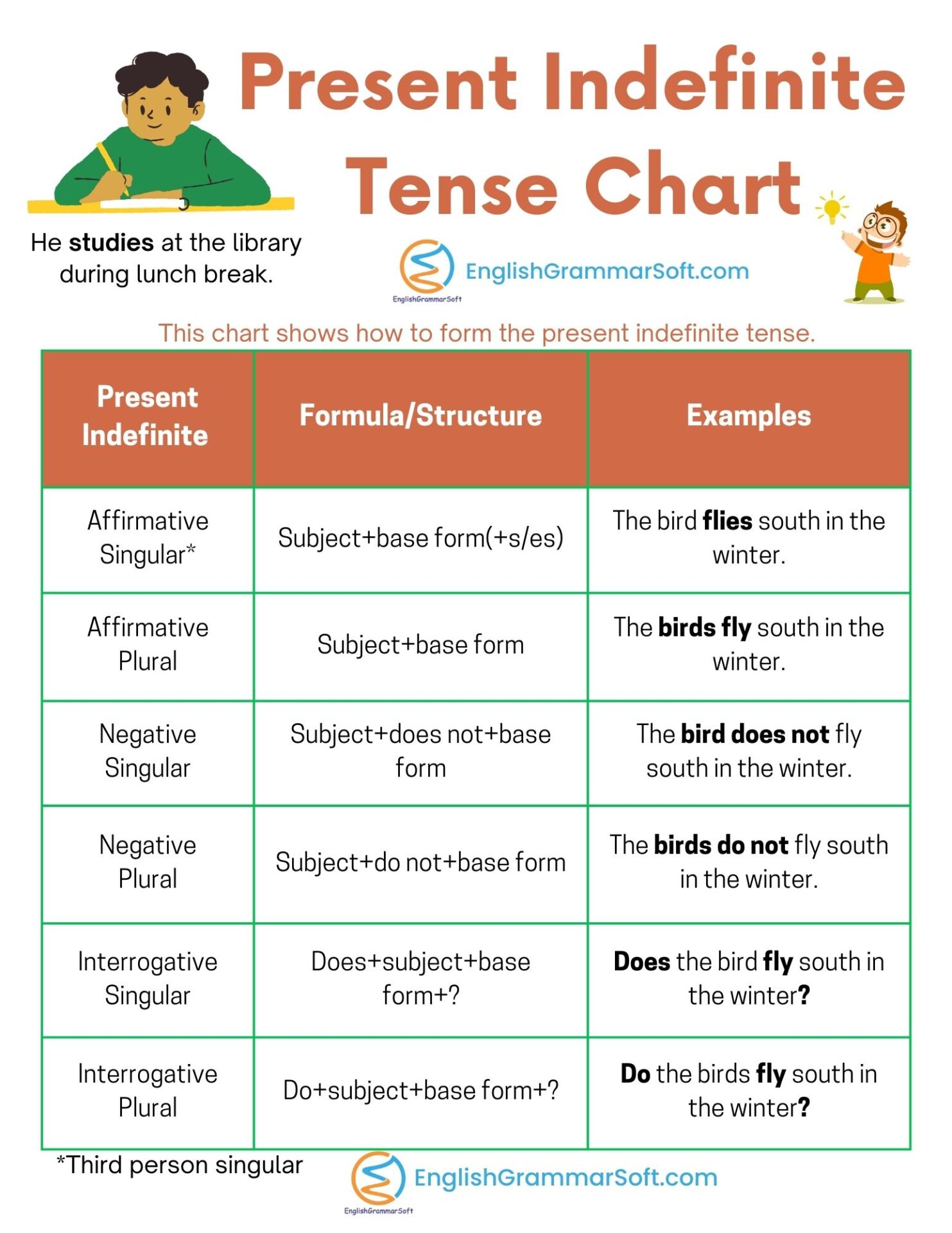
Where Do We Use Present Indefinite Tense?
The present indefinite tense is used in situations where we do not know the time of action. The present indefinite tense can also be used for habitual actions and to state general truths. See the examples showing use of present indefinite tense.
Examples
- I like reading books. (This is a habit I have)
- I have a dog. (I have had a dog for many years)
- He goes to work by bus every day. (The action takes place regularly)
- She likes eating chocolate. (The action takes place often)
- The sun rises in the east. (Permanent fact)
- The train leaves at 6 am daily. (to express time/date)
- They live next door to us since last year. (The action took place some time ago)
Rules for Present Indefinite Tense
The Present Indefinite Tense is the most common tense. There are three forms, singular, plural and third person.
The singular form is used when one person is doing something, the plural form is used when two or more people are doing something together.
The verbs in this tense are also known as simple present verbs. The third person singular form ends in -s or -es.
I like chocolate ice cream. (1st person)
We study English every day at school because we love learning English and we want to be able to speak it fluently someday soon! (2nd person)
The children play outside on their break time from school every day. (3rd person plural)
She bakes cookies. (3rd person singular)
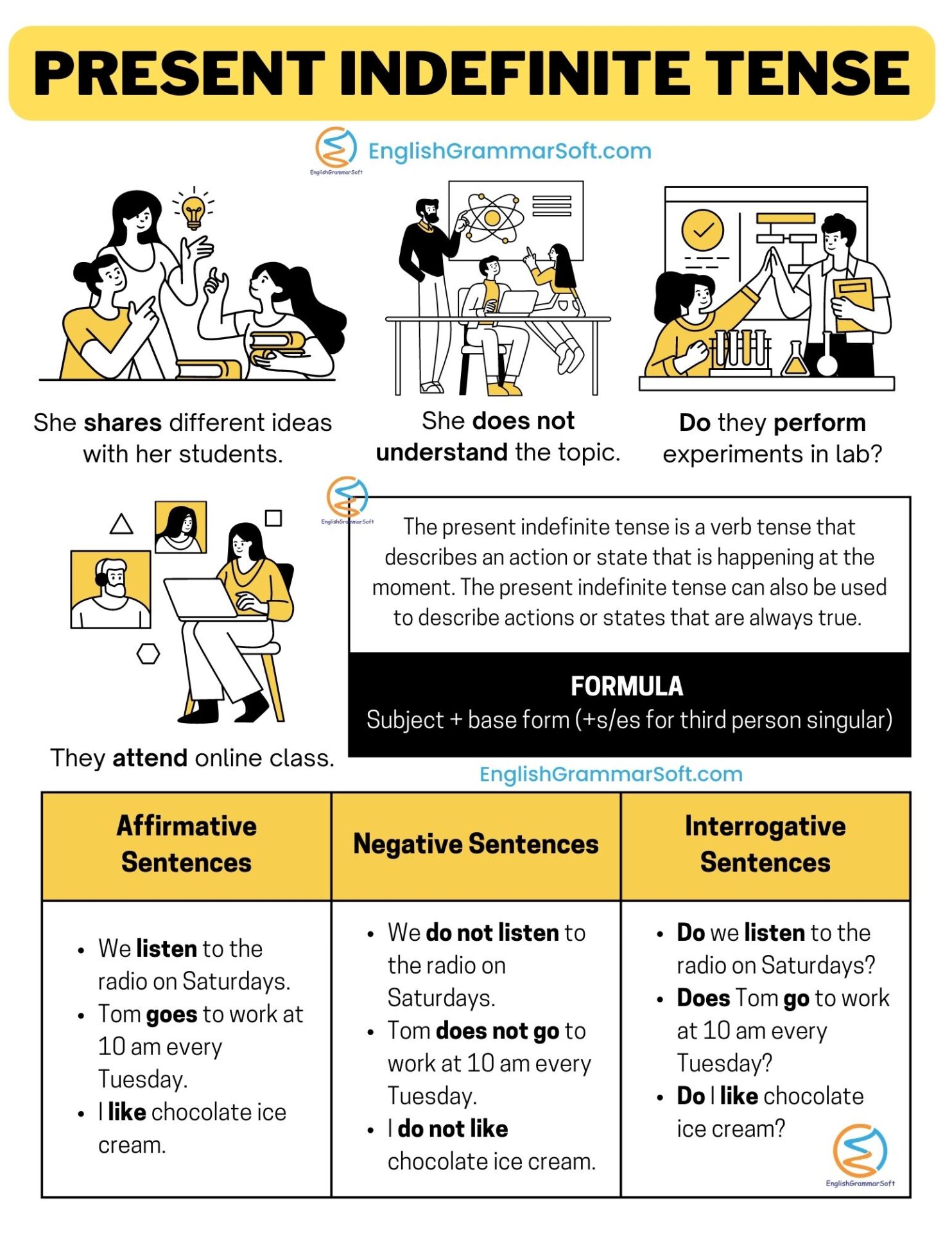
100 Examples of Present Indefinite Tense
Here are 100+ examples of present indefinite tense sentences in the affirmative, negative, interrogative, and negative interrogative forms.
Present Indefinite Tense Affirmative Sentences
- We are friends.
- He goes to the gym three times a week.
- She studies at the library during lunch break.
- We listen to the radio on Saturdays.
- Tom goes to work at 10 am every Tuesday.
- The child is happy today.
- Smith goes on holiday twice a year.
- The professor gives students long lectures on Wednesday mornings.
- The secretary works in the office between 9 am and 5 pm weekly.
- He arrives late to the office almost every day.
- We eat cake during lunch break once a week.
- The sales clerk opens the store at noon.
- We meet for coffee each Wednesday at 11 am.
- I eat spinach, cheese, and tomato omelet for breakfast every Saturday.
- Jenny works for a marketing company.
- Sarah wants to travel around the world next year when she graduates.
- I like chocolate ice cream.
- I do my homework after school.
- Sue and Jim spend most of their time outdoors.
- Dad leaves for work around 7.30 am and comes home at 6 pm.
- The children play outside during their break time.
- I work for an English company and have to travel a lot to other countries.
- The kids usually watch TV at weekends.
- Boys often play computer games after school.
- I like watching sports on Sundays.
- My parents are water polo players in their free time.
- They talk to their teacher every day.
- The dog goes to the park every day at noon.
- He smokes three packs of cigarettes a day.
- The firefighters carry hoses and walkie-talkies.
- He keeps his TV in the living room.
- They sell produce at the market on Thursdays.
- You meet your friends on Friday nights.
- He eats lunch at school.
- She plays with her friends at recess.
- Sarah completes her taxes in January.
- I drive down this street three times a day.
- The boss looks over the projections once a month.
- Bob often eats out with colleagues after work.
- My sister practices piano every day at 9 am.
- We do hard work in the classroom.
- I take a shower in the evening after work.
- I cook dinner for myself every night.
- I see my grandmother once a week.
- He spends a lot of time with his children.
- The dog wags its tail.
- We play kickball in gym class.
- She takes all her classes in economics very seriously.
- My dog runs around the yard.
- I ask every student to bring their book to class.
- He eats six eggs every morning for breakfast.
- She owns a red sports car.
- They work in the same office but do not know each other well.
- You speak French fluently, but your sister does not.
- My mother cooks pizza for me on Friday nights.
- It starts raining heavily suddenly in this season.
- She writes a lot of letters in the morning.
- The weather frequently changes in this region, so we must keep an eye on it regularly.
- I make sandwiches in the morning.
- They take me out for lunch every week.
Present Indefinite Tense Negative Sentences
- She does not speak Spanish every day.
- You don’t like coffee.
- Some students don’t learn properly in the classroom.
- I don’t need a book today.
- We do not use this guide.
- She doesn’t always have time for friends.
- We don’t see them much these days.
- It doesn’t usually snow much where I live in winter.
- We don’t eat fast food.
- Tom does not drive a car.
- We do not put sugar on our coffee.
- Harry does not play soccer.
- I don’t think we will stay here tonight.
- You do not understand this word.
- He does not spend money on expensive clothes.
- My job doesn’t pay well.
- They don’t get enough exercise.
- Phil never stays organized.
- We don’t repair many small appliances at home these days.
- The kids do not clean up their messes.
- My husband des not rake the leaves in our yard.
Present Indefinite Tense Interrogative Sentences
- Do you work on Saturdays?
- Does she have any sisters?
- Do you like the idea of chicken roaming around your tent?
- Does Martin finish his work on time?
- Do you have a Cuddly toy?
- Does he want to come with us?
- Where do you work?
- What do customers want to know?
- Do they play football every week?
- Do you talk less at your workplace?
- Do you like reading books?
- Does he like writing articles?
- Does she play the guitar?
- When do you come home from work?
- Does he like bananas?
- Do you know the answer?
- How do you know about it?
- What do you think of the situation?
- Do you believe that she is telling the truth?
- Do you have any idea how to do this?
- Does he know what she told me?
Negative Interrogative Sentences of Present Indefinite Tense
- Why do you not like coffee?
- Do you not like to travel with your friends?
- Do they not live there anymore?
- Does he not want to visit the park?
- Does Donna not know where I live?
- Do they not seem to understand the instructions?
- Does she not usually pay so much attention to detail?
- Does he not get there until quite late in the afternoon?
- Do we not see them very often?
- How do you not know the answer?
- Does he not talk loud on the phone?
- Do we not get on well with Tom’s parents?
Exercise for Present Indefinite Tense with Answers
Put the correct form of verb in these sentences.
- She _ (go) to the market.
- He _ (play) tennis every Wednesday afternoon.
- I _ (like) chocolate ice-cream best of all.
- We _ (work) hard all week long, but we still don’t have enough money to go on holiday next year!
- The children _ (not speak) English very well, but they are learning it in school now and they can understand some words and phrases already.
- The teacher _ (write) lots of letters during the holidays.
- I _ (eat) breakfast every day at 8 a.m.
- My friend _ (study) English for four years in university.
- The children _ (play) outside all day long during summer vacation.
- We _ (hear) bad news from our neighbor yesterday.
Present Tense Exercise (paragraph)
Tom (play) tennis. It’s a great way to exercise and relax. He (play) with a friend or two on Saturdays and Sundays, but sometimes he (go) alone. They (play) on the public courts in our town, which are available for free. Tennis is a fun sport to play because it doesn’t require much equipment — just a racquet and balls — and it’s an easy game to learn.
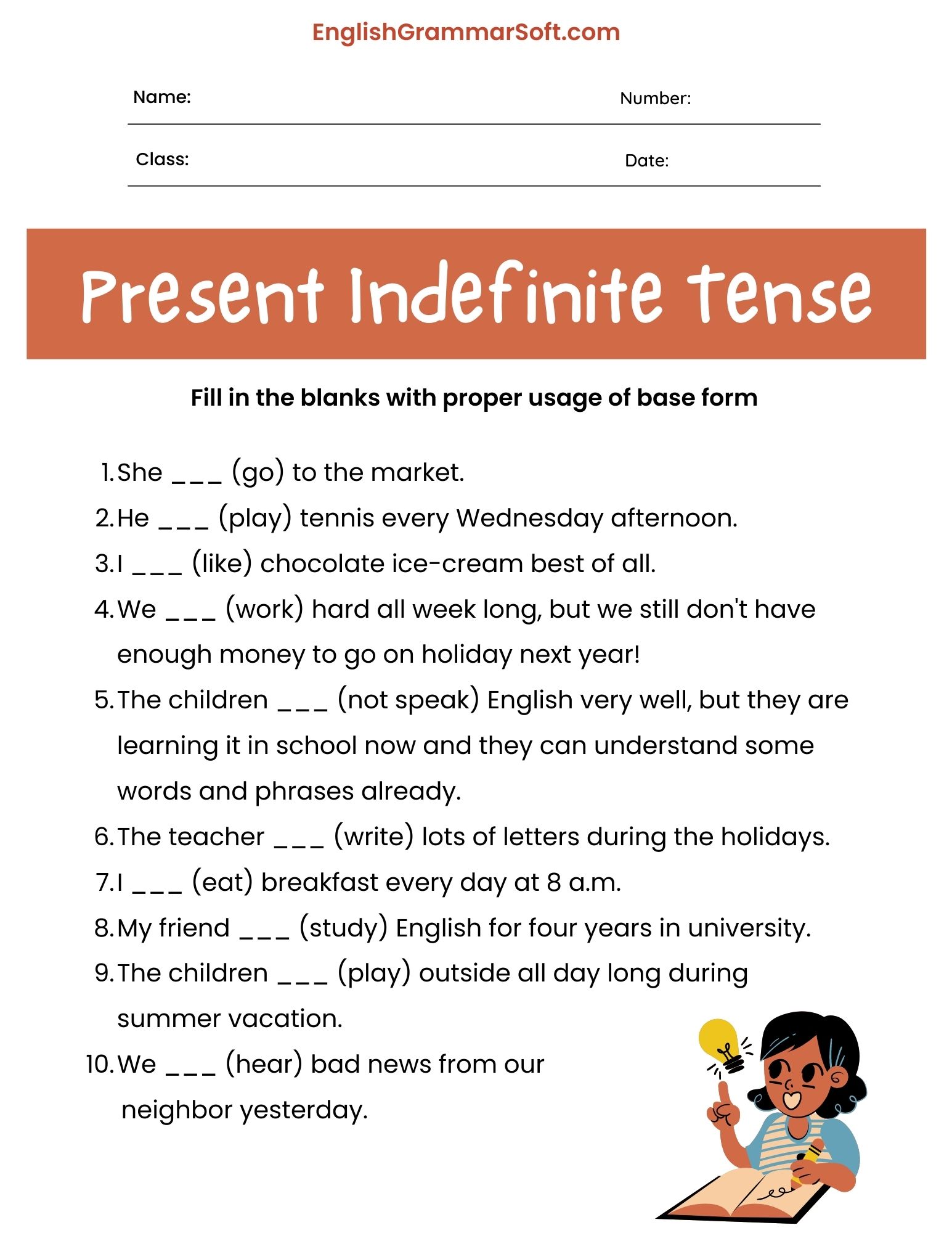
Answers (Sentences)
- goes
- plays
- like
- work
- do not speak
- writes
- eat
- studies
- play
- hear
Answers (paragraph)
- plays
- plays
- goes
- play
Further Reading
